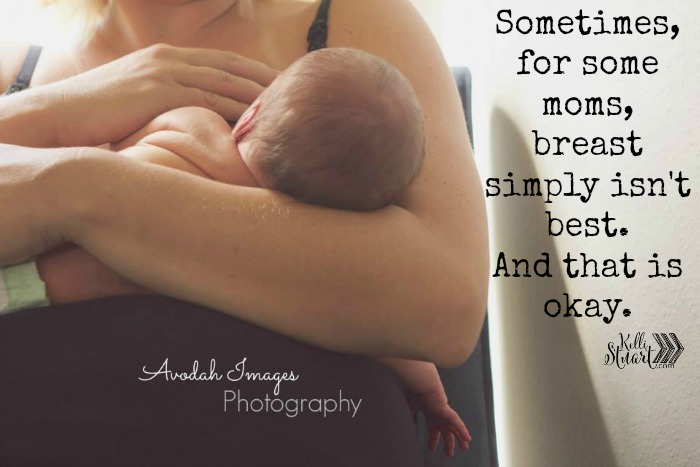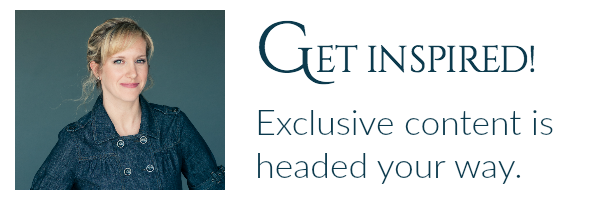I sat in the nurses station and glanced up at the wall. That’s when my heart sank.
Hanging on the wall was a poster that only confirmed, in my already emotional postpartum mind, that I was somehow failing my baby – that I had, in fact, failed all my children. It was my fault. I didn’t try hard enough. I didn’t eat enough protein or drink enough water or take enough vitamins.
Or maybe it was just me. I wasn’t enough.
Post pregnancy hormones are no joke. Rationality can slip right past us on any given day as we feel ALL THE FEELINGS all at the same time. So when confronted with posters like this one taken from the website Breastfeeding.com, a mother who is struggling to breast feed her baby is ripe for confusion and worry.
Before I had my first born, I thought the biggest hurdle I’d have to cross was natural childbirth. Once I got through that process, I assumed I’d be home free.
No one ever told me that breastfeeding was difficult.
While most women get their milk within 3-5 days, mine didn’t come in until day 8, and even then it was very little. In the meantime, my child was starving. He screamed hysterically day and night until I finally called the pediatrician and she had me start him on formula supplements.
I visited the lactation consultants, once again checking all pride and shame at the door as people I didn’t know had their hands in sensitive areas.
I took all the vitamins they suggested and ate the foods that were supposed to help increase milk supply. I drank gallons of water, laid around with a heating pad on my chest, and fed my baby every three hours, pumping in between feedings in order to stimulate more production.
Nothing worked. Within a month I was exhausted, my baby was still hungry, I was bruised from all the pumping, and I was an emotional wreck. As I sat in my chair cradling my newborn, I sobbed endlessly until my husband sat down beside me and told me to stop.
If only it were that easy.
I have tried and failed to breastfeed all four of my children. I would venture a guess that I’ve tried harder than most people. The work I have to do to produce a small amount of milk is astounding, and it’s unrealistic for me to maintain that type of schedule.
Posters and propaganda like the above do not help women like myself, or any others who either cannot breastfeed their children, or choose not to. So perhaps instead of pumping us full of fearful, and scientifically unsound, statements we could approach the topic of breastfeeding from a more gentle and understanding point of view.
Here is what we know as absolute fact:
– Breastfeeding is the safest, healthiest option for an infant if the mother is able to do it. It is scientifically proven that breastfeeding provides a child with excellent antibodies, and with a nutritionally balanced supply of food.
– Breastfeeding is cheaper. IT IS SO MUCH CHEAPER!
– Breastfeeding allows mother and baby to bond in a special and unique way. (Although feeding a child a bottle allows you to bond in different ways as you look into her eyes while you feed her.)
Here are the incredibly loose, and sometimes incredibly false, arguments presented:
– Breastfed babies are smarter.
Bull.
Brigham Young University released a study recently that gave insight into why breastfed babies score higher on IQ tests. And it has little to do with breastmilk.
Breastfeeding mothers tend to respond to their babies emotional cues, and they often begin reading to their children earlier (at 9 months of age).
“It’s really the parenting that makes the difference,” says lead study author Ben Gibbs.
So maybe instead of telling formula feeding moms that their children will be dumber than their breastfed peers, we could simply encourage ALL parents to adopt these obviously healthy parenting techniques.
– Breasted babies are leaner for life.
Ridiculous.
Once again, there are assumptions being made here that don’t take into account a number of other factors, namely both genetics and environment. The claim that a breastfed baby will learn to regulate his or her own eating habits for life simply because he was given breastmilk is ludicrous.
A child will learn lifelong healthy eating habits from parents who teach them. Parents who model healthy living will raise leaner children. Perhaps more breastfed mothers live their lives this way, but again, this has nothing to do with breastfeeding and everything to do with the parenting mindset. To connect the two is irresponsible.
– Breastfed babies are healthier and have fewer ear infections.
I can count on one hand the number of ear infections that all of my children have had in my eleven and a half years of parenting. Not one of my kids has had tubes put in their ears. Save from the obligatory yearly colds and illnesses that get passed around schools, my children have not been sick.
And they were all formula fed babies.
– Breastfed babies have lower risk of childhood leukemia, MS, allergies, and heart disease.
Once again, there is very little research to support these claims. Yes, a lack of breast milk could contribute to these things. But there are other risk factors that are much more likely including genetics, environment, and prolonged deficiencies in nutrition.
The fact of the matter is that it is simply irresponsible to put that kind of fear into a mother’s head when you have so little science to back up the claims. To make her feel that her choice not to breastfeed, or her inability to sustain it, will result in an obese, sickly child who has a lower IQ and is unable to properly bond to her is fear mongering at its very worst.
At the end of the day, if a mother is feeding her baby, she is doing something wonderful. Nourishing a newborn will inevitably require some sort of sacrifice. For breastfeeding mothers, it’s the sacrifice of freedom. For formula feeding mothers, it’s the sacrifice of finances.
But we are feeding our children, and what a miracle it is! We have options, and that’s a good thing. I’ve said on more than one occasion that I am so thankful for formula, because were I born in a different time, keeping my children alive could have been devastating.
So let’s stick to sound science, stop pushing fear on one another, and applaud the effort that it takes to sustain our newborns.




I am happy you are speaking up about this Kelli. I have seen your tears and frustration when trying to nurse your babies and having very little to give them. And I came to resent the pressure put on mothers who could not or chose not to breastfeed their children. That pressure has increased tremendously through the years. I am proud of your courage to blog about this! You Go Girl!
Yes. You’ve been the recipient of many a shed tear over this. Bless you… 🙂
Well said! Thank you for speaking out on this!!
Thanks, Sarah! It felt good to get this off my chest.
Pun TOTALLY intended. 😉
I had no troubles breast-feeding but I find those posters and all that pressure annoying too, to say the least. It’s like the natural childbirth crusaders who think any woman who has a C-section ought to hand in her mothering license. Now there’s a topic I could really get going on…For the record, the one I breast-fed for the shortest length of time (3 months) can whip out ridiculously hard math problems in her head faster than her two older siblings (both nursed a full year) AND her engineer father. And they all have allergies.
In my opinion, any woman who can keep her child from killing himself on a day to day basis is a hero and ought to be treated as such.
Says the mom who recently caught her child running across the roof with a NERF gun in his hand pretending to be a sniper.
I may not have breastfed my kids, but so far I’ve kept them from falling off roofs. So I win. And so do you. And so does the next woman.
We’re all in this together, yeah?